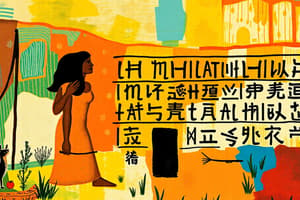Podcast
Questions and Answers
What was a pivotal role of agriculture in many ancient civilizations?
What was a pivotal role of agriculture in many ancient civilizations?
- Enabling people to build cities (correct)
- Creating advanced technologies
- Encouraging hunting and gathering
- Promoting nomadic lifestyles
Which writing system was used by the Sumerians and Babylonians?
Which writing system was used by the Sumerians and Babylonians?
- Cuneiform (correct)
- Alphabetic script
- Egyptian hieroglyphs
- Pictographs
What were urban centers in ancient civilizations like Rome, Athens, and Babylon known for?
What were urban centers in ancient civilizations like Rome, Athens, and Babylon known for?
- Avoiding diplomatic ties with other cities
- Being hubs of trade, culture, and governance (correct)
- Lack of trade opportunities
- Isolation from other regions
How did religious practices influence most ancient civilizations?
How did religious practices influence most ancient civilizations?
Which aspect was a direct result of the transition from hunting and gathering to farming in ancient civilizations?
Which aspect was a direct result of the transition from hunting and gathering to farming in ancient civilizations?
What was the role of rulers in ancient Egypt and Mesopotamia according to the text?
What was the role of rulers in ancient Egypt and Mesopotamia according to the text?
Which civilization made significant contributions to philosophy according to the text?
Which civilization made significant contributions to philosophy according to the text?
What were some societal challenges faced by ancient civilizations according to the text?
What were some societal challenges faced by ancient civilizations according to the text?
Why is understanding ancient civilizations important based on the text?
Why is understanding ancient civilizations important based on the text?
Which field did the Mayans excel in according to the text?
Which field did the Mayans excel in according to the text?
Study Notes
Ancient Civilizations
Throughout history, humanity has witnessed the rise and fall of numerous civilizations—complex societies with advanced cultures and technologies. These ancient societies have left us a legacy of their achievements, beliefs, and practices, providing valuable insights into our collective past. Let's delve into some key aspects of these early civilizations.
Agriculture: Agriculture played a pivotal role in many ancient civilizations, making it possible for people to settle down and build cities. This transition from hunting and gathering to farming allowed for surplus food production, which led to population growth and societal advancements.
Writing Systems: Many ancient civilizations developed writing systems, often referred to as scripts, which were vital tools for recording information, communicating ideas, and preserving knowledge across generations. Examples included cuneiform used by Sumerians and Babylonians, Egyptian hieroglyphs, and symbols known as pictographs among indigenous peoples of North America.
Urbanization: Following the agricultural revolution, urban centers emerged as focal points of trade, culture, and governance. Mega-cities like Rome, Athens, and Babylon served as hubs connecting distant lands through roads, shipping routes, and diplomatic ties.
Religion and Beliefs: Religious practices were central to most ancient civilizations, shaping their worldviews and governing practices. Deified kingship was prevalent in Egypt and Mesopotamia, where rulers were considered divine emissaries responsible for maintaining social order.
Cultural Innovations: In addition to basic necessities, historical periods saw innovations in various fields such as art, architecture, music, literature, philosophy, science, engineering, astronomy, mathematics, and medicine. For instance, the Ancient Greeks made significant contributions to philosophy, while Mayans excelled in astronomy and calendar development.
Societal Challenges: Despite their cultural prowess, ancient civilizations faced numerous challenges such as climate change, resource scarcity, warfare, disease outbreaks, and natural disasters. Some managed to adapt, while others declined or disappeared due to internal strife or external pressures.
In summary, understanding ancient civilizations is crucial because they laid the groundwork for modern society in terms of technology, arts, laws, economics, sociology, politics, military strategy, education, agriculture, religion, and medicine.
Studying That Suits You
Use AI to generate personalized quizzes and flashcards to suit your learning preferences.
Description
Test your knowledge on key aspects of ancient civilizations including agriculture, writing systems, urbanization, religious practices, cultural innovations, and societal challenges. Explore the legacies of early societies through this quiz.




